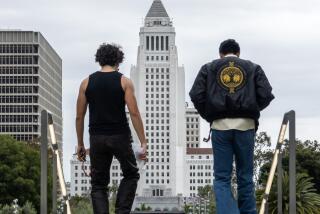Survey Seeks Reactions to Earthquake
- Share via
WHITTIER — A white-haired woman looked up from her gardening on a cloudy morning to find a neatly groomed young man carrying a stack of white papers.
“Hi,” said Kevin Campion. “I’m part of a research team working for New Mexico State University. We’re interviewing people that were in the Whittier earthquake. Were you living in Whittier at the time of the quake?”
After a bewildered glance and a short laugh, the woman, 89, said: “I sure was. I was watching ‘Good Morning America’ and spilled coffee on my lap running out the back door.”
List of 100 Questions
She invited Campion to have a seat on the patio of her Uptown Whittier home as he launched into the first of more than 100 questions covering everything from home repairs to earthquake-related nightmares.
The woman’s responses will become part of a $30,000 post-disaster study funded by the National Science Foundation and directed by New Mexico State University sociology Prof. Robert Bolin. About 200 people will be interviewed for the study, which examines how the Oct. 1 earthquake changed the physical and psychological lives of Whittier residents.
“The real concern,” Bolin said, “is how city, state and federal entities responded to this (earthquake) and what they can learn from this to respond to the big one” predicted to occur on the San Andreas Fault in the next 30 years.
More than a third of the survey addresses psychological earthquake recovery, with questions such as:
“How likely do you think it is that in the next five years you’ll move from Southern California to get away from possible earthquake dangers?”
“Have you had other experiences in your life more terrifying than the quake?”
“Do loud noises sometimes make you nervous and jumpy?”
Bolin, who has been studying the social aspects of disasters for about 15 years, says the Whittier study will “focus on the long-term adjustment dynamics, including the psychological aspects of being displaced from a home.”
“In disaster research, we’re starting to look at such things as post-traumatic stress disorder, which has been experienced by Vietnam veterans,” said Bolin, who directed a study in Coalinga, Calif., after the 1984 earthquake there.
“Earthquakes, from past research I’ve done, seem to be particularly stressful because, unlike a tornado, the threat continues.”
Bolin’s 1984 study compared disaster recovery by income and ethnicity in Coalinga, a tornado site and flood site. “The general finding is that if you’re poor to begin with, you’re going to have trouble recovering from the stress of disaster,” economically and psychologically, he said.
In Whittier, the focus of the study is broader, with questions about the effectiveness of earthquake relief efforts, financial aid from the government, earthquake insurance and other topics.
Whittier College students have been hired to go door-to-door conducting the interviews, mostly around the Uptown area where earthquake damage was the most severe. The students are paid $10 for each questionnaire, which takes about half an hour to complete.
Campion, who has completed 51 of the about 100 interviews done so far, said sleep disorders are the most common earthquake-related psychological problem he has found. Campion also noted that people would initially say they suffered no emotional strain from the earthquake but would acknowledge nervousness or nightmares when asked about specific problems.
Campion says most people have been willing to take part in the research. “The problem I have is terminating the interview, especially with the older people,” said Campion, a 31-year-old business major.
Although Bolin obtained from City Hall a list of about 1,500 residences that sustained earthquake damage, students are having better luck getting participants by interrupting people as they do yard work or sit on the porch, Campion said.
Names Not Needed
Those who agree to the interview are not asked for their names, and Campion emphasizes that the information will not become part of a sales list.
However, there are some people, such as one apartment building owner interviewed last week, who are reluctant to answer all of the questions. “I’ve got my gardening to do. I’ve got to go,” he said in the middle of the interview.
Bolin’s research grant is one of more than 20 post-earthquake research projects funded in the Los Angeles area by the National Science Foundation. The foundation has provided nearly $1.5 million to study the effects of the earthquake on wide-ranging topics such as the response of immigrant communities, the performance of steel buildings and the effectiveness of earthquake regulations. Bolin will report the results of the study late this summer.
More to Read
Sign up for Essential California
The most important California stories and recommendations in your inbox every morning.
You may occasionally receive promotional content from the Los Angeles Times.













